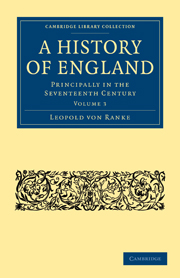Book contents
- Frontmatter
- Contents
- BOOK XI THE COMMONWEALTH IN ENGLAND, 1649—1653
- CHAP. I Republican ideas and institutions in England. The Levellers
- CHAP. II Rinuccini and Cromwell in Ireland
- CHAP. III Charles II and Cromwell in Scotland
- CHAP. IV Growth of the power of the Commonwealth by land and sea
- CHAP. V Dissolution of the Long Parliament
- CHAP. VI The Little Parliament
- BOOK XII THE PROTECTORATE OF OLIVER CROMWELL, 1653–1658
- BOOK XIII FALL OF THE PROTECTORATE AND THE COMMONWEALTH. RESTORATION OF THE MONARCHY, 1658—1660
- BOOK XIV THE FIRST FIVE YEARS UNDER CHARLES II. THE RESTORATION OF THE ANGLICAN CHURCH
- BOOK XV THE DUTCH WARS OF CHARLES II. ESTABLISHMENT OF THE PROTESTANT AND PARLIAMENTARY CHARACTER OF THE CONSTITUTION 1664—1674
CHAP. V - Dissolution of the Long Parliament
Published online by Cambridge University Press: 07 June 2011
- Frontmatter
- Contents
- BOOK XI THE COMMONWEALTH IN ENGLAND, 1649—1653
- CHAP. I Republican ideas and institutions in England. The Levellers
- CHAP. II Rinuccini and Cromwell in Ireland
- CHAP. III Charles II and Cromwell in Scotland
- CHAP. IV Growth of the power of the Commonwealth by land and sea
- CHAP. V Dissolution of the Long Parliament
- CHAP. VI The Little Parliament
- BOOK XII THE PROTECTORATE OF OLIVER CROMWELL, 1653–1658
- BOOK XIII FALL OF THE PROTECTORATE AND THE COMMONWEALTH. RESTORATION OF THE MONARCHY, 1658—1660
- BOOK XIV THE FIRST FIVE YEARS UNDER CHARLES II. THE RESTORATION OF THE ANGLICAN CHURCH
- BOOK XV THE DUTCH WARS OF CHARLES II. ESTABLISHMENT OF THE PROTESTANT AND PARLIAMENTARY CHARACTER OF THE CONSTITUTION 1664—1674
Summary
It was still the Republican Parliament under the auspices of which this power, practically absolute at home, and great and dreaded abroad, had been won. A political authority had been created of such concentrated strength and wide extent as the world had seldom witnessed, and Britain had never yet seen.
There is the more ground for wonder when we consider the variety of the elements out of which this authority was originally composed. These were three in number—the old Parliamentarian, the legal, and the military—each of them resting on different principles, but in fact working fairly well together. The army fought under the impulse of their religious and political tendencies; the Parliament had the direction of political affairs and provided the means of war; the participation of the lawyers preserved a state of law and order which first rendered this possible.
As a specimen of their combined action we may take the amnesty which, after long discussions, first took effect in February 1652. Forgiveness was therein proclaimed to the adherents of the King for all political offences previous to the battle of Worcester, provided they in turn pledged themselves to be faithful to the Commonwealth as now established without a King and House of Lords. Without some such agreement the civil war would have been incessantly carried on in secret. It was the condition which had also been imposed upon the conquered in Ireland and Scotland; and on the strength of it a formal union was hoped for. The acceptance of this pledge was the condition under which society existed.
- Type
- Chapter
- Information
- A History of EnglandPrincipally in the Seventeenth Century, pp. 71 - 84Publisher: Cambridge University PressPrint publication year: 2010First published in: 1875

